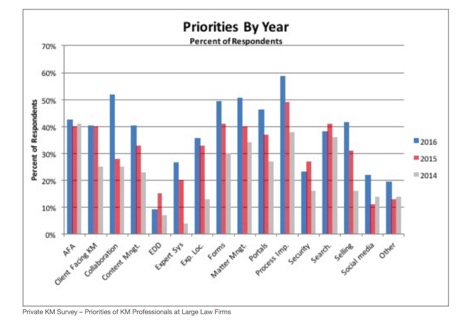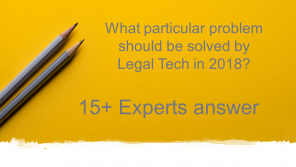Legal knowledge management appears to be on the rise. The definition of KM that I like best is the art and science of capturing and re-using legal know-how and identifying colleagues with relevant experience.
The Pressure Behind the Rise of KM. The corporate C-suite now demands that general counsels control legal budgets. GCs, in turn, pressure law firms for better value. So it’s no surprise interest in KM has grown. KM boosts lawyer productivity, a key ingredient to deliver better value. I use productivity here as most do, output per hour, not the law firm meaning of billable hours per year.
What Recent Published Surveys Tell Us about KM. Let’s look at what recent evidence tells us about the rise of legal KM:
- The 2016 Citi-Hildebrandt client advisory expects “to see more focus on knowledge management.”
- The 2015 Altman Weil law firm report finds that 68% of firms with 250+ lawyer firms have KM initiatives to improve efficiency.
- If we look just at KM technology, Mitratech, an enterprise legal software provider, recently released “Catching the Wave”, a survey of legal tech spending. It found that law department spending on KM technology will grow at 18% for the next few years. That is one of the highest growth rates in some 10 categories of software. I hope that growth rate holds: I hear too many stories of in-house counsel who pay for the same research or other legal work twice because they have no way to track prior outside counsel work.
Other Recent KM Growth Indicators: Three other 2015 developments point to the rise of KM:
- The ABA published a book on it, Knowledge Management for Lawyers by Patrick DiDomenico, CKO at Ogletree Deakins. The last legal KM book was published over a decade ago.
- The Law Practice Division of the American Bar Association started the Knowledge Strategy Interest Group. I do not recall prior ABA efforts focused on KM.
- Attendance at the 11th annual Ark KM conference in October 2015 broke prior attendance records, requiring a move to a larger venue to accommodate some 150 people from a range of large law firms.
I See Renewed KM Interest in My Consulting. The survey findings and 2015 developments are consistent with what I see in my consulting capacity: Fireman & Company’s has recently started several new large firm KM engagements.
So, Just What is it that KM Professional Do? To answer that question, consider a survey conducted in connection with an annual private meeting global legal KM professionals. Oz Benamram, the CKO of White & Case, Mary Abraham, a consultant, and I organize the meeting and run the survey. The chart below shows priorities of large law firm KM professionals over the last three years.

You may be surprised at the breadth of what KM professionals do. In the early days, around the turn of the century, the focus was mainly on creating precedent and taxonomies and building portals. The KM part of the focus grew to include enterprise search, experience location, expert systems, and collaboration tools. While the KM toolkit grew, so too did the remit of KM professionals. Today, many support alternative fee arrangements, process improvement, and legal project management.
This survey also provides evidence of the growth in KM. This year, almost 90 people from multiple Anglo-law jurisdictions answered the survey, up from about 60 in 2014. We have had an almost equivalent corresponding percentage increase in attendance of the meetings. (For a complete survey write-up, see my Strategic Legal Technology blog.)
Concluding Thoughts: For in-house lawyers, KM can improve efficiency of their own lawyers. And it can avoid paying law firms to do the same work more than once. Law firms can also improve efficiency. Plus firms can use KM to improve their service delivery, perhaps the only sustainable way to differentiate today.
This article was also published on LinkedIn by Ron Friedmann and is re-published here with the permission of the author.
Ron Friedmann is an expert in law practice management, outsourcing, knowledge management, e-discovery, legal marketing, and technology for lawyers. Ron helps law firms increase profits by improving law practice and legal business management with technology, better resource selection, KM, deep client understanding, and process improvement. He helps law departments “do more with less.” Ron is a consultant with Fireman & Company. Previously, he worked fours years at the leading legal outsourcing company, Integreon, first running global marketing, then heading US consulting for legal operations and transformation.



